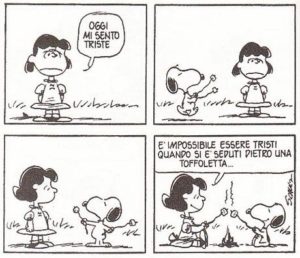Online family point. The joyous joy of emotions: sadness
Also this week, our Psychologist will address the issue of Emotions.
“Continuing our ride on the joy jousting of emotions, this week it's the turn of sadness. Usually considered as one of the negative emotions for the unpleasant psychological conditions that accompany it, sadness has an important function of adapting to the environment.
Sadness is linked to experiences of loss, loneliness and defeat, to some typical physiological reactions, such as increased blood pressure and decreased heart rate, and bodily aspects such as slowed-down eloquents and slumped posture.
Although it's not really pleasant to feel sad, it's very important to give yourself permission to feel and be sad: How come?[1]
Sadness allows us to signal to the other that we have Need of his presence and support, at a difficult time for us; some body signals, and the same crying, express to others what we feel and signal to them the need for closeness and help.
In addition, it allows us to take a break from external events to activate a path of reflection on the painful events we have experienced so that we can make sense of it, fundamental element in the process of processing unpleasant events.
Sadness tells us that something is wrong and to reflect on it and understand what it is is also a stimulus to change: if I'm suffering for it, what I need different to feel good?
Sometimes to avoid feeling sad, we are willing to put in place a set of strategies with which we move away from this emotion: from filling our agenda with things to do so we don't have time to be in touch with sadness, use of drugs. The consequence is that we deprive ourselves of the possibility both to understand what we want to change from this moment on into our lives, both to learn strategies useful to manage and live the sadness. The latter is very important, because life is also made up of sad experiences that are part of human existence and that in doing so we will never learn to face.
In the vignette I chose to accompany this piece, I think Lucy finds comfort not so much in the toffoletta, as much as in the fact that he has an opportunity to sit next to a fire with a friend, both very warm and enjoyable experiences”.
Dr Nicoletta Serra
Psychologist Psychotherapist Point Family Acli
Bibliography
Schaffer R. H. (2005), Developmental psychology. An introduction, Rffaello Cortina Publisher
Gavazzi I. G. (2009), Psychology of emotional development, The Mill
Roll D. (2005), Short dictionary of developmental and education psychology, Carocci publisher
[1] There are several factors that can intervene in determining the rule "it is not good to feel sad, it's not good to be seen sad" ranging from cultural factors, so, for example, if we were to be sad, we'll be rated weak, personal beliefs and experiences, how to be convinced that we won't find anyone willing to be close to us.
8 June 2020




 Italiano
Italiano English
English Français
Français Español
Español






